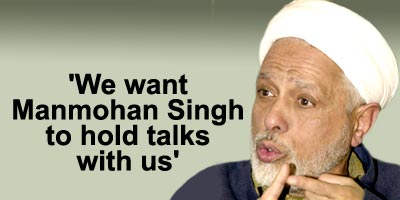Home > News > Interview
The Rediff Interview/Moulvi Abbas Ansari
October 25, 2004

When Moulvi Abbas Ansari, former chairman of the All-Parties Hurriyat Conference, said in Srinagar recently that the Irish formula should be used to settle the 'dispute of Jammu and Kashmir,' he did not know what he was talking about.
"Frankly, I do not know much about this agreement," he told Associate Editor Onkar Singh over the telephone from Srinagar. "If you know something about it please let me know."
Ansari time and again emphasised that the border should be opened to facilitate people-to-people contacts.
You said in an interview that you favour the Irish model for Jammu and Kashmir. Is that true?
Frankly, I do not know much about this agreement myself. If you know something about it please let me know. What happened was that someone came to me and asked if an Ireland-type of solution would be acceptable. I said if it could bring peace to Jammu and Kashmir and in South Asia, it would be good.
 | Also Read |  | |
|
When did you first hear about the agreement?
I was in jail along with other Hurriyat leaders when then US president Bill Clinton came to India. It was then that we heard that Clinton had favoured this kind of a solution so that the people on the two sides could meet.
But nothing concrete emerged out of it. What we are looking for is that the Kashmiris living on the Indian side and the Kashmiris living on Pakistani side should be allowed to go across and meet each other without passports.
Is it feasible?
Why not?
Before 1953 Kashmiris on the two sides used to take permits and travel across and attend family functions. If an Indian can go to Nepal with proof of his identity, why should this not be feasible in Kashmir as well?
How will you apply the Irish formula?
I have discussed the matter with my colleagues and those who understand the Irish peace agreement. It is a good solution but it has one difficulty: the people of Kashmir will have to opt for continuing with India or Pakistan. There are some other practical difficulties as well. I personally feel that this may not be the ideal solution.
There are reports that Hurriyat Chairman Mirwaiz Omar Farooq met Pakistan President Pervez Musharraf in a European country and held secret talks with him. Is that true?
Mirwaiz Omar Farooq is back after visiting some countries and he will give a report about his visits to the APHC executive committee next week. If he met General Musharraf then the whole world would have known about it. The news was carried by one of the television channels, Zee, but it did not name its sources.
Do you have any solution?
We have several solutions, but the important thing is that the Government of India and government of Pakistan must involve the people of Kashmir in finding a solution to the Kashmir problem.
The trouble is that both India and Pakistan at the moment are not interested in making the Kashmiris a party to the talks.
The Indian government has been asking the Hurriyat to come forward for talks.
They want us to talk to Indian Home Minister Shivraj Patil. Then prime minister Atal Bihari Vajpayee had appointed L K Advani for holding talks with us. Advani was deputy prime minister and had a certain standing in his government. We want Prime Minister Manmohan Singh should hold talks with us.
Dr Singh plans to visit Kashmir in November. Will you meet him?
Already Manmohan Singh has cancelled his visit to Kashmir twice. Now I am told he will come after Id. We have no plans to meet him at the moment. But if we are invited we would like to go.
Dialogue should be meaningful.
Meaning?
The talks must be taken to its logical conclusion. That is what we want. The people of Kashmir, whose future is at stake and who are getting killed on both sides of the border, must be satisfied with the solution.
What if the people on the two sides are allowed to meet each other using passports?
That would amount to accepting the present situation as ac solution. Which would mean that the Kashmir on the Indian side would stay with India and the other side would stay with Pakistan. This is not the solution that is acceptable to us.
Then there is an Andorra kind of solution. Is that acceptable to you?
We discussed that as well. I think this one is more close to reality. France and Spain together look after the defence of Andorra and the people have the right to do what they want and move about freely. But this may take time.
India and Pakistan could look after the security of Kashmir and a number of other things jointly. This does not offer us the right to self-determination, which was promised to us by Pandit Jawaharlal Nehru at the United Nations. The people of united Kashmir must know what they are going in for.
Photograph: STR/AFP/Getty Images
Image: Uday Kuckian